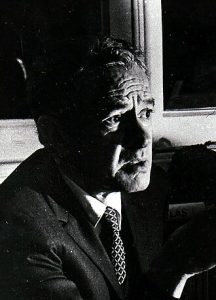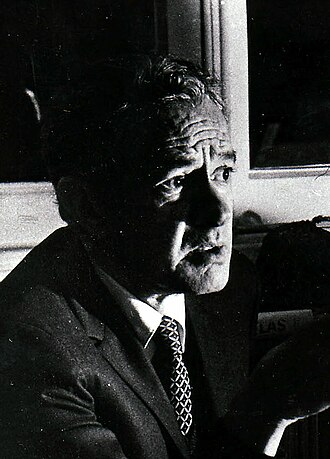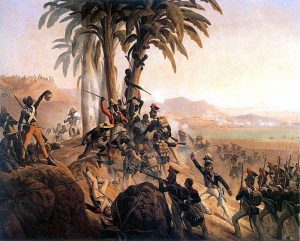Versión original escrito por: Juan Rulfo
Traducción al Spanglish hecha por: Maurissio González
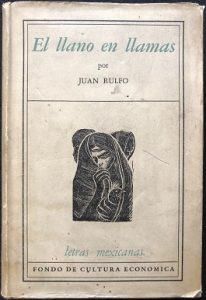
After many horas walkin’ sin findar ni one sombra de arbol, ni one seed de arbol, ni one root de nothin’, se lisenea el barking of los perros.
Uno ha belido sometimes, en middle of this camino sin restriction, que nothin’ hay despues; que no se findara nothin’ al otro side, al end of this plain with cracks y secos streams. Pero si, hay something. Hay un pueblo. Se lisenea que barkean los perros y se siente en el air el smell del smoke, y se saborea ese smell de la people como si fuera una hope.
Pero el pueblo ta’ muy far still. Es el wind el que lo acerca.
We been walkin’ since el sunset. Ya son como las four de la tarde. Someone mira al cielo, estira los eyes hacia donde esta hangin’ el sol y says:
-Son como las four de la tarde.
That someone is Meliton. Along him, vamos Faustino, Esteban y yo. Somos four. I count them: two adelante, otros two atras. Mireo mas atras y veo a no one. I say to myself: <Somos four.> Hace rato, como a eso de las eleven, eramos veinty-something; pero lil’ by lil’ se han ido dispersando hasta quedar nothin’ but este nudo que somos us.
Faustino says:
-Puede que llueva.
We all levantamos la cara y mireamos una nube negra y heavy que pasa por over our heads. Y thinkeamos:
<Puede que si.>
No decimos lo que thinkeamos. Hace ya time que se nos acabaron las ganas de speakear. Se nos acabaron con la heat. Uno speakearia muy a gusto somewhere else, but aqui is difficult. Uno speakea aqui y las words se calientan en la boca con la heat de outside, y se le resecan a uno en la lengua hasta que acaban con el breath.
Aqui asi son las cosas. Por eso a no one le da por speakear.
Caea una drop de agua, big, fat, hace un agujero en la tierra y deja una marca como la de un salivazo. Caea alone. We wait a que sigan cayendo mas. No rain. Now si se mira el sky se mira la rain cloud yendose far away, a toda prisa. El wind que viene del pueblo se le arrima pusheandola contra las blue sombras de los cerros. Y la drop caida por error se la come la tierra y disappears en su sed.
Quien diablos haceria this plain tan grande? Para que sirve, eh?
We continue walkeando. Nos habiamos stopiado pa’ ver rain. No rain. Now volvemos a walkear. And I think que hemos walkeado mas de lo que nos hemos moveado. I think that. Had it rain maybe thinkearia other cosas. Anyway, yo sabo que since I was a muchacho, no vi rain nunca over the plain, what is called lluvia.
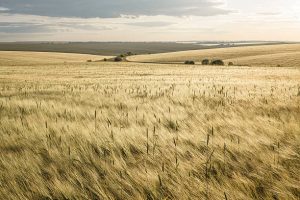
No, the plain is not a cosa that sirva. There ain’t rabbits ni birds. There is nothin’. Maybe unos huizaches sequiados y pequenos spots de zecate con curled hojas; is that, or nada.
Y here andamos. The four of us a pie. Before andabamos a horseback y teniamos a carabina. Now we don’t even have la carabina.
I have always thinkeado que eso de taking la carabina ta’ bien. Por aca is peligroso andar armed. They kill you sin avisar, if they see you with <La 30> strapped to your hombro. But los caballos are otro asunto. If we came on horseback ya hubieramos tasted la agua verde del river, y taken our bellies por las calles del rancho para llenarlos de comida. Ya lo hubieramos hecho de tener aquellos caballos que teniamos. But they also took them from us with la carabina.
I turn everywhere y todo I see is the plain. Tanta y tamana tierra for nothin’. The eyes slip al no findar something that stops them. Just a few lagartijas go out a asomar la cabeza over their burrows, y luego que sienten la calor del sun runen a hidearse en la sombrita de una piedra. But us, when we gotta trabajar here, que haremos to cool from the sun, eh? Why did they gave us this dried crust of land so we can sow it.
They said:
-Del pueblo para acá es de ustedes.
We asked:
-The plain?
-Sí, el llano. Todo el Llano Grande.
We paramos la jeta to say que the plain no lo wanteabamos. Que wanteabamos lo que estaba by the river. From the river to alla, por las vegas, where there are esos trees called casuarinas y las grasslands y la good soil. No this hard piece of cowhide leather that is called el Llano.
But they did not let us say our cosas. El delegado did not venia a conversar with us. He placed los papeles on la mano and told us:
-No se vayan a asustar por tener tanto terreno para ustedes solos.
-But the plain, senor delegado…
-Son miles y miles de yuntas.
-But there is no agua. Not even para hacer un drink hay agua.
-¿Y el temporal? Nadie les dijo que se les iba a dotar con tierras de riego. En cuanto allí llueva, se levantara el maíz como si lo estiraran.
-But, senor delegado, la land is worthless, hard. No believeamos que el arado se entierre in that like cantera that es the land of el Llano. You will have to dig agujeros with el azadon to plant a seed y ni aun asi es positive que nazca nada; ni maiz ni nada will grow.
-Eso manifiéstenlo por escrito. Y ahora váyanse. Es al latifundio al que tienen que atacar, no al gobierno que les da la tierra.
-Wait, senor delegado.We did no dijeamos nada contra el Centro. Everything is contra el Llano…You can not contra lo que no se puede. That is lo que hemos dijeado… Wait usted para explainiarle. Look, let us comenzar por donde ibamos…
But he did not want to herear.
That is como they gave us esta tierra. And in this comal acalorado they want us to plantar seeds of algo, to ver if algo springs up. But nothin’ will spring aqui. Ni zopilotes. Uno sees them alla cada y cuando, muy up, flying a la carrera; trying to leave lo mas pronto posible from this thick dust cloud, where nothin’ se mueve y por donde uno moves two steps forward y one step back.
Meliton says:
-Esta is the land que nos han dado.
Faustino says:
-What?
I do not say anything. I think: <Meliton has lost his cabeza. Ha de ser la calor that makes him say that. La calor que has passed his sombrero y le ha calentado la cabeza. If not, porque dice lo que dice? What land have they gave us, Meliton? Here there ain’t enough tierra for the wind to jugar a los remolinos.>
Meliton speaks again:
-Servira for something. Servira at the very least to correr yeguas.
-Which yeguas?- Esteban asks him.
I had not paid attention bien to Esteban. Ahora que spekea, I notice him. He is wearing a gaban que le llega al ombligo, and under the gaban something that looks like a chicken saca la cabeza.
Si, is a Rhode Island Red chicken he carries under the gaban. You can see its ojos dormidos and su pico open como si bostezara. I ask him:
-Oye, Teban, where did you snatch that chicken?
-Es la mia- he says.
-You did not la traias antes. Where did you buy it, eh?
-I did not buy her, es la gallina de mi coral.
-So you brought it as provisions, no?
-No, I bring her para cuidarla. Mi casa se quedo sola y sin nadie para que le diera feed; that is why I am bringing her. Siempre que salgo lejos me la llevo.
-Hidden there se te va a ahogar. Mejor sacala al aire.
He places it under his brazo and blows hot air at it. Then says:
-Estamos llegando al derrumbadero.
I can not herear lo que Esteban continues saying. We are en fila to bajar la barranca and he is adelante. Se ve que he is carrying the chicken by the feet y la zangolotea a cada rato, to not slam its head cotra las piedras.

Conforme bajamos. La tierra se hace buena. Sube polvo from us as if it was an atajo de mulas lo que baja por alli; but we like to llenarnos de polvo. We like it. After comin’ from pisando la dureza del llano for eleven hours, we feel muy a gusto wrapped in what jumps over us and tastes of dirt.
From encima del river, over las copas verdes of las casuarinas, vuelan flocks of chachalacas verdes. That is something that we also like.
Ahora el barking of los perros se lisenea aqui, next to us, that is becouse el viento que viene del pueblo bounces en la barranca and fills it with all its sounds.
Estaban hugs his chicken cuando nos acercamos a the first houses. Unties its legs to make it stretch, y luego him y su chicken disappear behind unos tepemezquites.
-Por aqui arriendo yo! -Esteban tells us.
We go ahead, farther into el pueblo.
La tierra que nos han dado esta alla arriba.
Juan Rulfo (1917-1986) fue uno de los autores mexicanos más importantes e influyentes del siglo XX. Rulfo sufrió los efectos de la Revolución Mexicana: su abuelo y su padre murieron a causa de ella. Por esta razón, Juan Rulfo escribió historias crudas y deprimentes. Además, fue uno de los primeros escritores en capturar la forma de hablar del pueblo en sus obras. Aunque el uso del Spanglish es mal visto en nuestra sociedad, estoy seguro de que a Juan Rulfo le habría encantado que uno de sus cuentos fuera traducido al Spanglish.
Recomiendo leer los demás cuentos de Juan Rulfo de El llano en llamas y también su novela Pedro Páramo.
Quiero expresar mi agradecimiento a la Dra. Peace por otorgarme la oportunidad de traducir “Nos han dado la tierra” al Spanglish y por guiarme en este camino.
